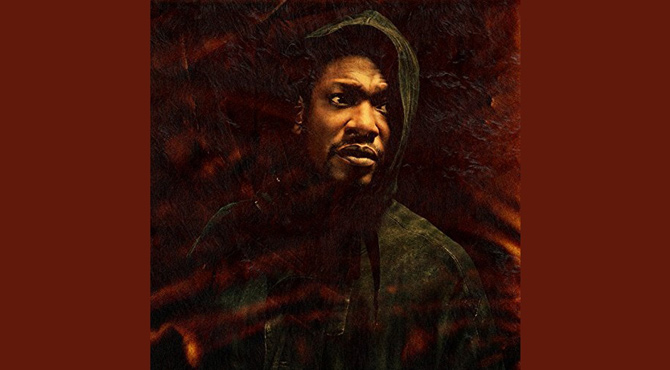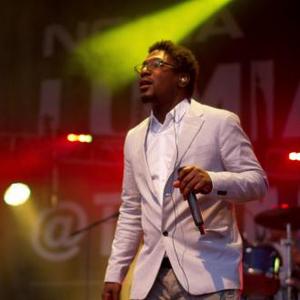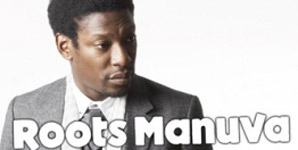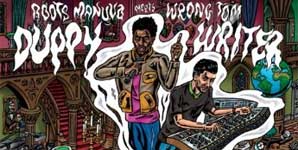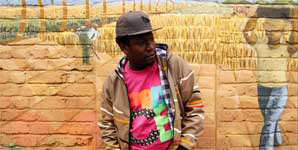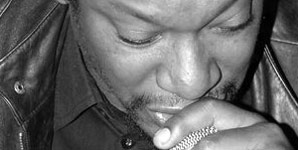
Roots Manuva, Interview
28 August 2012Roots Manuva Interview
Having been in the game for nearly twenty years now, Roots Manuva still shows no signs of slowing down. That said, when he's putting in the type of performance he put on when headlining this year's Beacons festival, then who's to blame him?!
We managed to catch up with the hip-hop hero for a quick Q&A after his performance at the Skipton festival to talk all about Yorkshire, London, Jamaica and even parts of New York too!
How's Beacons Festival been for you so far?
The Yorkshire Dales are a nice place to be; it's so green and got such a cool vibe, it's always a pleasure to be up here. Yorkshire is a really cool place, the people are usually great and I love the music that the region produces as well, so yeah, like I say, it's always a pleasure to be here and always a pleasure to be invited to these types of things.
Being a guy who lives in and is active in the music scene, are you up to date with the Yorkshire hip-hop scene like the Sinoptic label and Don't Flop?
Name wise, probably not [laughs]. But the last time I knew a distinct Yorkshire hip-hop sound was Caleaf maybe, Mike Mears and probably Jehst, who's still going strong today. As for the newer stuff, I'm not really up to date with what's happening at the moment but might get round to giving them a listen someday.
You currently reside in Sheffield and, as you've said, you are a fan of what Yorkshire has to offer. Do you like to think of Yorkshire as being your adoptive home?
Well, I was born in London and I've got kids who are born in Yorkshire, so I'm really just in-between Yorkshire and London; there's no real home base at the moment. I mean, I've got family that live in Sussex and I'm always travelling so you could say I'm all over the UK to a certain extent - I spent a lot of time living in Edinburgh for a bit - but yeah, I'm divided between Sheffield and London.
Well, moving away from Yorkshire for a bit, let's talk about your set. You bring in quite a sizeable band with you on stage and perform a little more multi-dimensional than past shows. Is this a nod to your influences for your latest work?
Well, this kind of set up is for whenever I can use it; it's not always that I'll use a band. There are many situations or many gig offers that only allow me to perform solo or maybe with a DJ. Sometimes, some gig offers only allow for it just to be me, especially in these days where things are really tight.
Every time I can, I use a band like this; it's a very special thing to do. All the records that I've made over the years involve different levels of collaborative efforts and only by bringing a full set up on stage can I properly explore my past songs and perform them as they should be performed. Even when it's just small parts like, I may use the drummer to recreate a drum part that I've looped on a track or I might have used a bit of guitar or keyboard. It's really just a mish-mash of all the different bands and instruments I've use over the years right in front of you.
How important is touring today when compared to when you first got started? Is there more of an emphasis to go out and tour new material more than ever before?
Touring has always been important. Performing live has always been the way that an artist can really control their environment. From pictures to videos to anything, there's always a way that someone can change what you do into something else but when you're on stage, it's all you. Touring is much more from the heart and it is what it is.
I do think there is a bit of a hype, too much of a hype, and an over-urgency towards going live now. Too many people are seeing touring as the only way you can make a living, but I still don't really see it as that. It's definitely one lucrative area, but if people keep talking with all the doom and gloom and not apply themselves towards actually making music then nobody is going to want to listen to music in the first place. It can't just be more important than ever just because it is, it must be more important now because there is a connection between artists and audiences who are trying to push things forward.
Being on stage for so long now, do you ever get bored of playing certain tracks on stage?
Nah because every show is always different; it's always good to go out around the world when you have a rapport with different audiences and see how people respond to your stuff. For example, we've just come off the back of a tour all across England and every place we play is totally different! It's so mad that England is such a small place; it shouldn't really be so different but everyone has their own slight preferences to different sounds, so it's always good just to see how people will respond to a track than worry that it's the umpteenth time I've played it.
Do you think there is a specific audience or location where you are received better than others?
I wouldn't say people are warmer in their reception of me in some places. In Yorkshire, people tend to know a lot more about my catalogue; there's no need for introduction because they know the tune and they know what they want to hear. If it's a date on a proper Roots Manuva tour then it can get into quite a greatest hits thing because the people have paid their money and they know just what they want to hear. People contact me on Twitter and what-not now saying, "I've paid this to see you and you better play this and that" but I'm just like, "Woah it's not about that."
It's not about that man; it's about the vibes in the audience and the vibes in the air and it's about playing in a way that I feel the audience will enjoy the most.
You can hear a large Jamaican influence over your music, especially on stage. Would you consider yourself as someone who has been impressed more by this sound than they have hip-hop over the years?
I see it all as one thing, ya know? It's all just one kind of mesh where an artist can take what he likes from one particular sound and use it for his own purpose regardless of which genre it lands under.
The hip-hop story, or how hip-hop developed in America, was someone from Jamaica; DJ Kool Herc was from Jamaica but moved to New York to showcase this sound that he knew from home and nobody understood it! So he had to flip it a little bit and out of that comes the hip-hop story, although there's obviously much more to it than that.
It's good to actually hear someone distinguish the countries never mind the music actually because the thing is, talking to different journalists across the globe, especially in Europe, they don't even distinguish Jamaica not being part of America. People from the Eastern European nations have interviewed me saying my parents are from America, not even knowing that Jamaica is its own country!
But going back to the question, hip-hop is generally the music for people who don't have that much going on for them; it's the sound of the under-class. The whole notion of sampling and what-not wouldn't be around if it wasn't for hip hop, people took those two turn tables and used them to their limit, they're still doing it now! Making loops on records and using the turn table as an instrument, that's the element of hip-hop I celebrate and that's the element of hip-hop that will always resonate with me and will always influence me the most - it's about the science of trying to capture any old thing and seeing what comes out on the other side.
UK Hip Hop at the moment is as big as it ever has been, with acts going trans-Atlantic and taking over the charts. What's your take on the current crop of popular hip-hop artists?
I think it's all good to be honest, no matter how these new artists sound because, at the end of the day, it's more life to the spectrum of the culture and the genre of hip-hop. I'm in a totally different headspace that I was say, fifteen years ago. If you asked me the same question fifteen years ago I would have been "nah it's all bollocks, I'm the real stuff" [laughs].
But when you lay down what is popular in hip-hop today, they still celebrate the elements of the genre, whether they know it or not. I think that's what the beautiful thing of hip-hop and bass culture is, that it's so infectious and people keep on taking on the baton and using all the elements; half the time they don't even know what they're doing. They're just out there, having a good time and making lots of money with it. But still, they're spreading the word, they're creeping into the minds and hearts of mainstream society and it's a good thing.
How long do you think you'll be on the road and making music for?
It will be forever. It's forever and ever [laughs].
Bands like The Grateful Dead have played for years and years; the Rolling Stones are still going. As long as there's an audience, I will be as long as I'm there.
Joe Wilde
Official Site - http://www.rootsmanuva.co.uk
Contactmusic
Top 10 Videos
Wallace Chung
XXX
1
10 Years
Beautiful
2
Fast Girls
Fast Girls
3
Shaggy
Hey Sexy Lady
4
Air
Sexy Boy
5
The Staves
Tired As F***
6
Robin Thicke
Blurred Lines (Unrated Version)
7
All That Remains
Six (Live)
8
Fugees
Boof Baf
9
Fleur East
Sax [Live]
10
